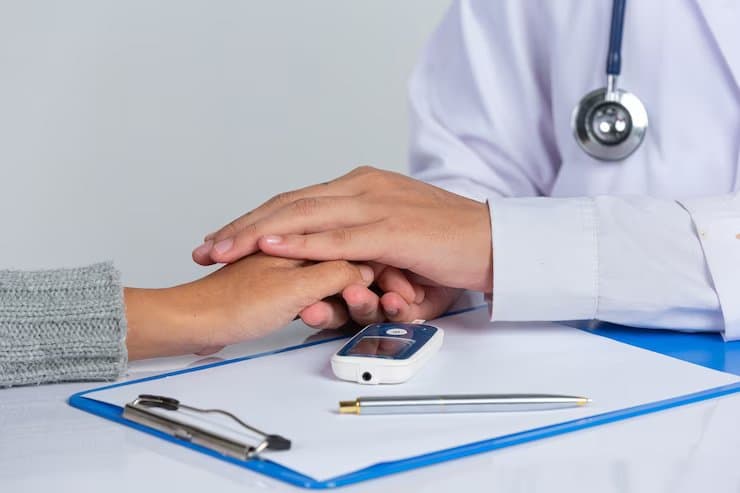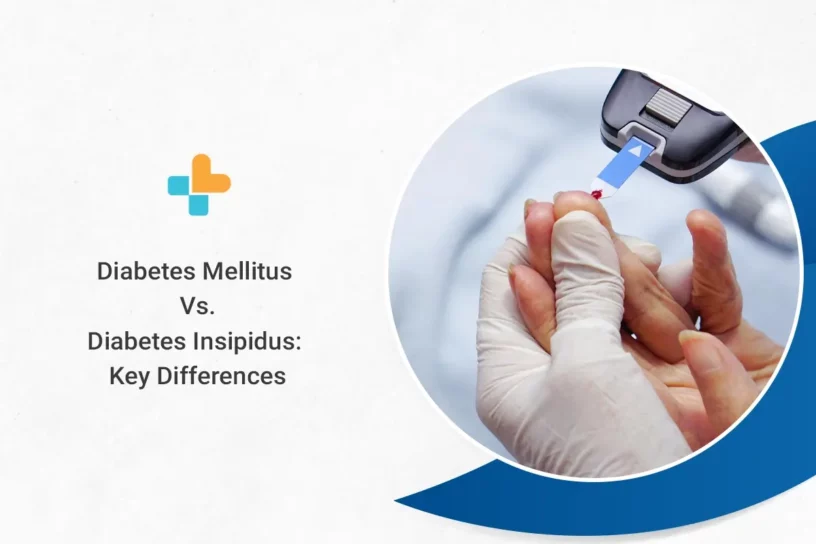Diabetes mellitus and diabetes insipidus sound similar, so it’s not uncommon for people to get confused between the two. They’re both different conditions and come with different sets of symptoms.
In this article, we’ll explore these two distinct medical conditions that share the common name “diabetes” but have different underlying causes and symptoms.
To help you understand the dissimilarities, here’s a comparative table highlighting their characteristic features:
| Parameters | Diabetes Mellitus | Diabetes Insipidus |
| Cause | Lack of physical activity, poor diet, obesity or being overweight, or genetics. | Hormonal problems that cause dehydration. |
| Types | Type 1, Type 2, Gestational, etc. | Central diabetes insipidus, Nephrogenic diabetes insipidus |
| Urine Output | Normal or increased | Excessive (polyuria) |
| Urine Composition | Presence of glucose and ketones | Diluted urine (low osmolality) |
| Thirst | Increased thirst (polydipsia) | Normal thirst |
| Blood Glucose Level | Elevated levels (hyperglycemia) | Normal blood glucose levels |
| Fluid Intake | Regular or restricted | Increased fluid intake |
| Hormone Involved | Insulin | Antidiuretic hormone (ADH) |
| Treatment | Insulin therapy, oral medications, lifestyle changes | Hormonal replacement therapy, fluid regulation |
| Potential Complications | Cardiovascular disease, neuropathy, retinopathy, kidney disease, etc. | Dehydration, electrolyte imbalance |
Now that you’ve understood the basic differences between diabetes mellitus and diabetes insipidus, let’s explore some of their key differences.
Diabetes Mellitus
Diabetes mellitus is a metabolic disorder marked by insulin resistance or deficiency, which results in elevated blood glucose levels. It’s a chronic illness that needs to be managed on an ongoing basis to avoid complications.
Symptoms
- Frequent urination (polyuria)
- Excessive thirst (polydipsia)
- Unexplained weight loss
- Fatigue and weakness
- Increased hunger (polyphagia)
Diagnosis
- Fasting plasma glucose test
- Oral glucose tolerance test
- Hemoglobin A1c (HbA1c) test
Treatment
- Lifestyle modifications (healthy diet, regular exercise)
- Oral medications (e.g., metformin, sulfonylureas)
- Insulin therapy (injections or insulin pump)
- Blood glucose monitoring
- Regular check-ups with healthcare professionals
Treatment approaches may vary based on the type of diabetes mellitus (e.g., Type 1, Type 2, gestational), individual needs, and healthcare provider recommendations.

Diabetes Insipidus
Diabetes insipidus is an uncommon disorder marked by the body’s inability to effectively regulate fluid balance, resulting in excessive thirst and frequent urination.
Symptoms
- Frequent and excessive urination (polyuria)
- Intense thirst and increased fluid intake (polydipsia)
- Nocturia (getting up several times during the night to urinate)
- Dehydration and dry mouth if fluid intake is inadequate
Diagnosis
- Water deprivation test to evaluate urine concentration
- Measurement of blood and urine osmolality
- Blood tests to assess levels of antidiuretic hormone (ADH)
- Imaging tests (MRI) to identify potential structural abnormalities in the brain or kidneys
Treatment
- Hormonal replacement therapy with desmopressin (synthetic ADH)
- Medications to increase sensitivity to ADH (nephrogenic DI)
- Proper fluid management and regulation
- Addressing the underlying cause, if possible, such as surgery or medication adjustment
A medical professional must be consulted for a proper diagnosis and individualized treatment of diabetes insipidus.
Managing Diabetes Mellitus and Diabetes Insipidus
Understanding the difference between diabetes mellitus and diabetes insipidus is crucial for accurate diagnosis and appropriate management. By recognizing the unique symptoms, diagnostic criteria, and treatment approaches of these conditions, individuals can take proactive steps toward their health. You can also explore these seven habits to avoid diabetes.
We recommend visiting Ayu Health’s NABH-accredited diagnostic centres. With fixed-price packages, affordable rates, convenient payment options, and complete insurance support, Ayu Health ensures accessible and comprehensive healthcare.
Prioritize your well-being with Ayu Health today.
Testimonials
“Hi. I’m J P Swami. I’m 78 years old. I’ve been suffering from diabetes for the last 8–10 years. After looking for many hospitals, I found Ayu Health and requested their team for help. They set up an appointment for me with Dr Abhay. I was very happy with his services.”
Patient Name: J P Swami
Treated for: Diabetes
Doctor Name: Dr Inderjeet Abhay Alubhailya
City: Delhi
Watch this complete video :
FAQs
1. Is Diabetes Insipidus a Common Condition?
No, diabetes insipidus is a rare disorder, affecting approximately 1 in 25,000 people.
2. Can Diabetes Insipidus be Cured?
No, diabetes insipidus cannot be cured because it currently has no approved treatment. But, it can be effectively managed with proper care and lifestyle changes.
3. Are There Any Long-Term Complications Associated with Diabetes Insipidus?
Yes, there are long-term complications associated with diabetes insipidus. If left untreated or poorly managed, diabetes insipidus can lead to complications such as dehydration, electrolyte imbalances, kidney problems, and in severe cases, even organ damage.
Also Read : 5 Health Benefits of Jamun: From Cancer Prevention to Controlling Diabetes
References:
https://diabetes.org/healthy-living/medication-treatments/insulin-resistance
https://www.ncbi.nlm.nih.gov/pmc/articles/PMC4751088/
https://www.ncbi.nlm.nih.gov/books/NBK526095/
https://www.ncbi.nlm.nih.gov/books/NBK470458/
https://www.sciencedirect.com/science/article/abs/pii/B9780128199497000214
https://ayu.health/blog/how-to-avoid-diabetes-7-habits-you-should-develop/
Our Hospital Locations
General Surgery Hospitals in Chandigarh | General Surgery Hospitals in Bangalore | General Surgery Hospitals in Jaipur | General Surgery Hospitals in NCR | General Surgery Hospitals in Hyderabad
Our Doctors
General Surgery Doctors in Chandigarh | General Surgery Doctors in Bangalore | General Surgery Doctors in Jaipur | General Surgery Doctors in NCR | General Surgery Doctors in Hyderabad
About the Author

Dr. S. Goel
Dr. S. Goel is a renowned Internal Medicine Specialist currently practicing at Ayu Health, Bangalore. He is a Specialist in Internal Medicine, Diabetes HTN, Paediatric Care, and Family Medicine.




